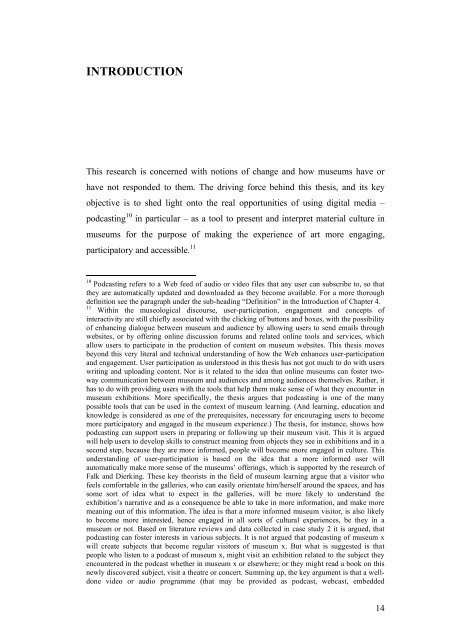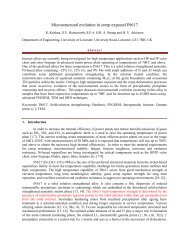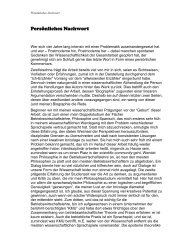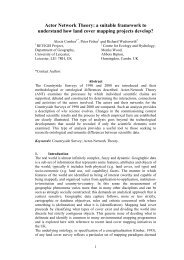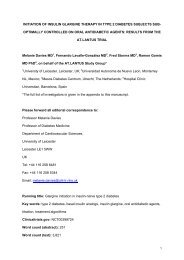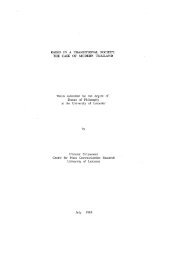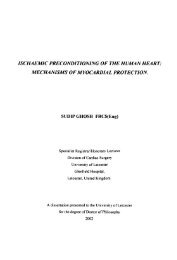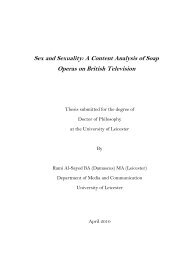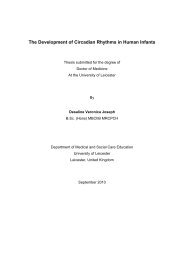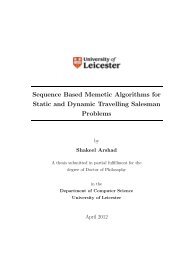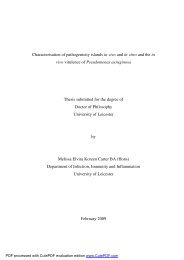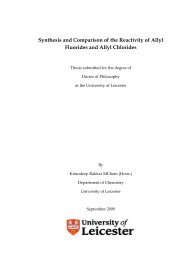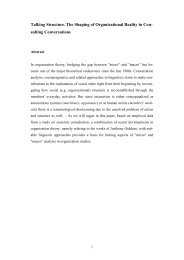5 Case Study 1 - Leicester Research Archive - University of Leicester
5 Case Study 1 - Leicester Research Archive - University of Leicester
5 Case Study 1 - Leicester Research Archive - University of Leicester
You also want an ePaper? Increase the reach of your titles
YUMPU automatically turns print PDFs into web optimized ePapers that Google loves.
INTRODUCTION<br />
This research is concerned with notions <strong>of</strong> change and how museums have or<br />
have not responded to them. The driving force behind this thesis, and its key<br />
objective is to shed light onto the real opportunities <strong>of</strong> using digital media –<br />
podcasting 10 in particular – as a tool to present and interpret material culture in<br />
museums for the purpose <strong>of</strong> making the experience <strong>of</strong> art more engaging,<br />
participatory and accessible. 11<br />
10 Podcasting refers to a Web feed <strong>of</strong> audio or video files that any user can subscribe to, so that<br />
they are automatically updated and downloaded as they become available. For a more thorough<br />
definition see the paragraph under the sub-heading “Definition” in the Introduction <strong>of</strong> Chapter 4.<br />
11 Within the museological discourse, user-participation, engagement and concepts <strong>of</strong><br />
interactivity are still chiefly associated with the clicking <strong>of</strong> buttons and boxes, with the possibility<br />
<strong>of</strong> enhancing dialogue between museum and audience by allowing users to send emails through<br />
websites, or by <strong>of</strong>fering online discussion forums and related online tools and services, which<br />
allow users to participate in the production <strong>of</strong> content on museum websites. This thesis moves<br />
beyond this very literal and technical understanding <strong>of</strong> how the Web enhances user-participation<br />
and engagement. User participation as understood in this thesis has not got much to do with users<br />
writing and uploading content. Nor is it related to the idea that online museums can foster twoway<br />
communication between museum and audiences and among audiences themselves. Rather, it<br />
has to do with providing users with the tools that help them make sense <strong>of</strong> what they encounter in<br />
museum exhibitions. More specifically, the thesis argues that podcasting is one <strong>of</strong> the many<br />
possible tools that can be used in the context <strong>of</strong> museum learning. (And learning, education and<br />
knowledge is considered as one <strong>of</strong> the prerequisites, necessary for encouraging users to become<br />
more participatory and engaged in the museum experience.) The thesis, for instance, shows how<br />
podcasting can support users in preparing or following up their museum visit. This it is argued<br />
will help users to develop skills to construct meaning from objects they see in exhibitions and in a<br />
second step, because they are more informed, people will become more engaged in culture. This<br />
understanding <strong>of</strong> user-participation is based on the idea that a more informed user will<br />
automatically make more sense <strong>of</strong> the museums’ <strong>of</strong>ferings, which is supported by the research <strong>of</strong><br />
Falk and Dierking. These key theorists in the field <strong>of</strong> museum learning argue that a visitor who<br />
feels comfortable in the galleries, who can easily orientate him/herself around the spaces, and has<br />
some sort <strong>of</strong> idea what to expect in the galleries, will be more likely to understand the<br />
exhibition’s narrative and as a consequence be able to take in more information, and make more<br />
meaning out <strong>of</strong> this information. The idea is that a more informed museum visitor, is also likely<br />
to become more interested, hence engaged in all sorts <strong>of</strong> cultural experiences, be they in a<br />
museum or not. Based on literature reviews and data collected in case study 2 it is argued, that<br />
podcasting can foster interests in various subjects. It is not argued that podcasting <strong>of</strong> museum x<br />
will create subjects that become regular visitors <strong>of</strong> museum x. But what is suggested is that<br />
people who listen to a podcast <strong>of</strong> museum x, might visit an exhibition related to the subject they<br />
encountered in the podcast whether in museum x or elsewhere; or they might read a book on this<br />
newly discovered subject, visit a theatre or concert. Summing up, the key argument is that a welldone<br />
video or audio programme (that may be provided as podcast, webcast, embedded<br />
14


